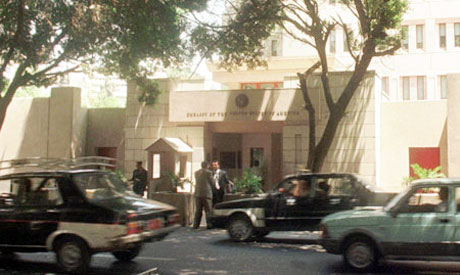 US officials met with a number of prominent Egyptian activists, bloggers and journalists at the US embassy in Cairo on Monday.
US officials met with a number of prominent Egyptian activists, bloggers and journalists at the US embassy in Cairo on Monday.
Under discussion was the controversial recent visit of Secretary of State Hillary Clinton and the broader relationship between Egypt and the United States.
The meeting was attended by the US Department of State's Regional Deputy Spokesperson for the Middle East, Daniel Ernst, his assistant, Ana Escrogima, and David Linfield, the assistant press attaché at the embassy.
Ahmed Maher, founder of the April 6 Youth Movement, activist Esraa Abdel-Fatah, TV host Bassem Sabry, Ramy Yaacoub of the Free Egyptians Party, journalist Abdel-Moneim Mahmoud from Al Jazeera Mubashir Misr, and a number of prominent Twitter activists were among the Egyptians in attendance.
Escrogima denied the US is playing a mediating role between the Supreme Council of the Armed Forces (SCAF) and the Brotherhood, as had been claimed in the Egyptian media.
She added that the purpose of Clinton's visit had been to listen to all interested parties and groups, as well as the government and civil society organisations that are playing a role in Egypt's democratic transition.
Furthermore, she said the US had made no secret deals with anybody, despite claims in the Egyptian media that the US had backed the Muslim Brotherhood's Mohamed Morsi in the presidential election.
“Egyptians will decide for themselves how the democratic transition will take shape. We are here as friends to help Egypt,” Ernst commented in reply to a later question about the role of the US in the recent elections.
Regarding the Muslim Brotherhood's strong relationship with Hamas, which is classified by the US as a terrorist group, Ernst said the US has relationships with governments as long as they do not support terrorism.
Ernst also claimed not to be concerned that Egyptian liberals were protesting against the US because people should be able to freely express their opinions and "this how democracy works."
Regarding comments made by the US ambassador in Cairo, Ann Patterson, and Deputy Secretary of State William Burns about the importance of having an elected parliament following President Morsi's attempt to restore the parliament after it was dissolved by the SCAF following a court ruling, David Linfield said the ambassador's statement was misunderstood. She had merely said that having an elected parliament was important, not any particular parliament.
Moving onto the issue of civil liberties and the rights of women and minorities, Escrogima said these were important issues for the US and its official raise them with the Brotherhood on a regular basis.
TV host Bassem Youssef criticised the official reaction of the US to the NGO workers trial and said it jeopardized the work of NGOs in the country and civil society groups in general.
In February 43 foreign NGO workers were accused of operating in Egypt and receiving US funds without the appropriate authorisation. Most of them subsequently left the country after a travel ban imposed upon them was lifted and have not returned.
Youssef also expressed his fear that Egypt was turning into another Pakistan: “It is similar to the situation [in Pakistan] whereby the US supports the military and the Islamist government at the same time.
When asked about Syria by Ahram Online, Ernst said the US is still against a military solution to the conflict because the situation is different to the one in Libya, which has a smaller population.
“The situation in Syria is very complicated and the US is trying to speak with all the opposition groups,” said Ernst, in response to comments that the opposition abroad does not necessarily represent all Syrians inside the country.
“The five permanent members of Security Council, including the US, Russia and China, approved Kofi Anan's plan, which included the withdrawal of the army from towns and the ceasefire,” Ernst said.
He added that in Geneva the international community had begun to draw up a transitional plan for the future of Syria that would include opposition figures as well as members of the current government who do not have blood on their hands.



